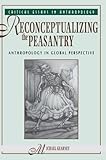Reconceptualizing the peasantry: anthropology in global perspective / Michael Kearney
Por: Kearney, Michael [autor].
Tipo de material: Libro
impreso(a)
y electrónico
Series Editor: Boulder, Colorado, United States: Westview Press, 1996Descripción: xiv, 210 páginas ; 23 centímetros.ISBN: 0813309883; 9780813309880.Tema(s): Campesinos
Libro
impreso(a)
y electrónico
Series Editor: Boulder, Colorado, United States: Westview Press, 1996Descripción: xiv, 210 páginas ; 23 centímetros.ISBN: 0813309883; 9780813309880.Tema(s): Campesinos| Tipo de ítem | Biblioteca actual | Colección | Signatura | Estado | Fecha de vencimiento | Código de barras |
|---|---|---|---|---|---|---|
| Libros |
Biblioteca Chetumal
Texto en configuración de biblioteca Chetumal |
Acervo General | 338.1 K4 | Disponible | ECO030007258 | |
| Libros | Biblioteca Electrónica Recursos en línea (RE) | Acervo General | Recurso digital | ECO400500192910 |
Bibliografía: páginas 187-200
eBook published 7 February 2018
List of Figures.. Preface.. Introduction.. The Death of Dualism.. The Context of This Book.. Notes.. Chapter 1. San Jeronimo: A Peasant Community?.. Lencho Martinez, a Peasant Man?.. Rufina Vasquez, a Peasant Woman?.. Eliseo and Lucrecia Mendoza, Peasant Youth?.. Notes.. Chapter 2. Kinds of Others in the History of Anthropology.. Formative Anthropology and the Primitive.. Classical Anthropology and the Primitive.. Modern Anthropology and the Invention of the Peasant.. Global Anthropology: From Cold War to Peasant Wars.. Notes.. Chapter 3. Peasants and the Antinomies of the Modern Nation-State.. The Deep Structure of the Modern Nation-State and Its Anthropology.. Right-Wing Modernism.. Left-Wing Modernism.. Right and Left Modernization of the Peasantry Reconsidered.. Problems with Peasant Essentialism.. Beyond Stated Definitions.. Notes.. Chapter 4. Romantic Reactions to Modernist Peasant Studies.. Right-Wing Romanticism.. Left-Wing Romanticism.. From Dependency to Articulation.. From Articulation to Disarticulated Economies.. The Legacy of Romantic Reactions.. Sustainability or Stagnation?.. Beyond Dualist Theory.. Notes.. Chapter 5. Beyond Peasant Studies: Changing Social Fields ofldentity and Theory.. Postdevelopment.. From Articulation to Networks to Reticula.. Globalization and Differentiation.. From Modern Structures to Global Complexity.. Notes.. Chapter 6. Differentiation and Identity.. From Individual to Person.. Internal Versus External Differentiation.. Decline of Class Identity and Increase in Class Difference.. Value, Differentiation, Community, and Autonomy.. Notes
Chapter 7. From Modes of Production to Consumption of Modes: Class, Value, Power, and Resistance.. Class.. Resistance.. Value.. Value-Power and Class.. Summary.. Notes.. Chapter 8. 'Peasants' and the New Politics of Representation.. Postpeasant Futures: Class Again.. The Mixtec Case: Fragmentation of Identity and Politics.. The Reintegration of Mixtec Identity: From Peasant to Postpeasant Politics.. Globalization of Human Rights and Ecopolitics.. Notes.. Bibliography.. About the Book and Author.. Index
Disponible para usuarios de ECOSUR con su clave de acceso
The concept of?peasant? has been constructed from residual images of pre-industrial European and colonial rural society. Spurred by Romantic sensibilities and modern nationalist imaginations, the images the word peasant brings to mind are anachronisms that do not reflect the ways in which rural people live today. In this path-breaking book, Michael Kearney shows how the concept has been outdistanced by contemporary history. He situates the peasantry within the current social context of the transnational and post? Cold War nation-state and clears the way for alternative theoretical views.Reconceptualizing the Peasantry looks at rural society in general and considers the problematic distinction between rural and urban. Most definitions of and debates about peasants have focused on their presumed social, economic, cultural, and political characteristics, but Kearney articulates the way in which peasants define themselves in a rapidly changing world. In the process, he develops ethnographic and political forms of representation that correspond to contemporary postpeasant identities. Moving beyond a reconsideration of peasantry, the book situates anthropology in global context, showing how the discipline reconstructs itself and its subjects according to changing circumstances. spa
Disponible en línea
Adobe Acrobat profesional 6.0 o superior
Subscripción a EBSCO Julio del 2020
